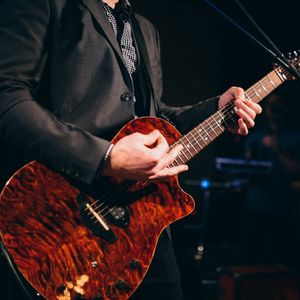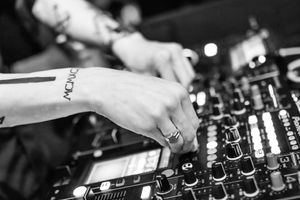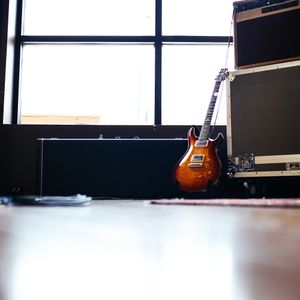Hey guys!
Yesterday, as the New Year came rolling in, I officially released my debut solo EP called Vision Never Dies. It is a big deal for me, as I have never really released music as a recording artist before, though not for years of pining over such a dream.
The crazy thing about this EP is that I did it all myself, from writing to mastering; all the parts, the instrumentation, the recordings, performances, editing, mixing, and mastering, all done in-house in my home studio. In a way, it was the culmination of years of developing my skills as an engineer, composer, and songwriter. In that sense, I thought I'd share a few lessons I learned throughout this entire process of making my debut EP a reality. This might get a little long, so why don't you listen to my new EP while you read? Just make sure to click that first song so you get to hear the whole thing :-)
1. Writing and Recording are the single most important parts of the process.
I know this seems obvious, but if you can get it right on recording day, the engineering almost doesn't even matter. You'll hear some top-level engineers say things like "the song basically mixed itself." What they are really saying is: "The recordings, writing, and arrangement of the song were so well done and so thought out, that there were vastly less decisions for them as a mix engineer to make." 
There's a very good reason why classical music is barely processed at all engineering-wise; it's because the quality of musicianship is at such a level that every note is purposefully placed. Every pitch, breath, and dynamic. For that reason, maintaining the integrity of the performance is of utmost importance–also in general, but classical music particularly pertains to this principal. This is contrasted to mosts kinds of popular music, where a decent amount of processing is routinely used at the minimum, even on recording day. So whenever you hear anyone say you can "fix it in the mix," you're not doing yourself any favors. Get it right on the recording, and the end-result will always be better 100% of the time.
2. The One Thing NO ONE Ever Talks About...Editing.
This somehow eluded me for the longest time. I knew it existed, but before making this EP, I had zero editing skills or even its context within the engineering process. I literally had to go asking around The Recording Revolution to find out, because even Graham doesn't talk about it all that much. The reality is that editing is one of those unnoticed parts of the process that can make the biggest difference in your final product. There could be some sort of cabal of top-level engineers conspiring against us lowly beginners, willingly withholding certain information so that they can maintain their evil profits...
As funny as that is, the truth is far more mundane. Editing isn't really talked about, because it's just a given. Any pro-engineer who has interned at a studio has set up a senior engineer's project and edited it so that the engineer can just focus on the mixing. In fact, that's when you as an intern get to look over their shoulder as they mix the song. That's the traditional way of learning how to be an engineer. Editing is part of the training that you get. It's such a basic engineering skill that it's barely talked about because it's so obvious...to those from that traditional world. Even if you wanted to be a full-time engineer, the current economy doesn't quite allow for an adult to commit that much time without running into financial trouble–something too many pro studios just don't understand. So we have to find our own way, which is why the online audio engineering tutorial market is so huge and saturated.
Let me know in the comments if you've ever done this as a beginner; but there was a time where I would lay down a recording, and then immediately start fiddling an EQ and compressor before even finishing all the other parts. To be clear: I wasn't creating a sound to be recorded, I was processing an already recorded sound. Now, this is fine if you're doing this with purpose and focus; but, I wasn't. All I knew was, "EQ and compression are used when mixing," so I'd pull out an EQ and compressor and just go to town with no real goal, direction, or awareness of where I was in the process of making this EP.
Editing was sort of all wrapped up into that somewhere. I would start comping and editing things before the recording process was even finished. By constantly switching between two distinct processes, any sense of flow and momentum was lost as the constant back and forth was just exhausting and caused a ton of self-doubt. Editing is it's own step. It's not part of mixing, though, if it were, it would be the very first step. Here's a basic rundown of what you want to do, AFTER all of the recording is completed:
- Go through every single instrument and make sure they are all on tempo and that all the entrances and exits sound smooth and solid (look up micro-fades).
- Looking for artifacts in the recording–like clicks, pops, mouth noises, etc.
- Anything, absolutely anything that sounds off or takes you out of the song in any way needs to be edited so it doesn't.
Editing takes serious critical listening skills. Make sure everything sounds as awesome as possible. Believe me, you do not want to be doing mix revisions and realize there's a terrible hiss on the acoustic guitar...been there...
3. Don't do it all alone.
If I could do one thing over, I would have asked my friends to help me write, record, and arrange this EP. I'd even outsource the mixing or mastering if I had the budget to, and here's why: Writing, recording, editing, mixing, mastering; these are all separate processes for a reason.
Not only are they separate processes, but it's extremely common for the recording engineer to separate from the mix engineer, and the mix engineer separate from the mastering engineer. Put simply, it's because the more finely-tuned ears that get into the project, the more perspective you have, which results in better music. This general workflow for releasing music has been cobbled together through decades of record releases. Ignoring it, or failing to educate yourself on it is a recipe for disaster...
...But we can't afford all these professionals when we're starting out, so the best thing to do is to collaborate. Find other people to work with to make your creation as amazing as it can be. Even just sending your mixes to some friends or people you look up to, or on an engineering forum somewhere will give you some desperately needed perspective. As the sole creator, we are simply too close to the project to be as objective as we need to be.
Sure, you CAN do it all alone, I did; but guess what, it will never be quite as good as having another set of ears to chime in, to feel invested in the music and the final product, even if you have to pay them. It's worth it. There's nothing more bittersweet than having a glass of wine alone on New Years Eve to celebrate the realization of your dreams. Including others in those dreams only serves to elevate them and everyone involved.
If you haven't already, you can stream my debut EP Vision Never Dies below for free, or if you want to download it, you can name your price. I would absolutely LOVE to hear what you think in the comments!
Thank you all so much for all the love, support, and strength you have given me in this long and arduous process.
Happy New Year 2017!
